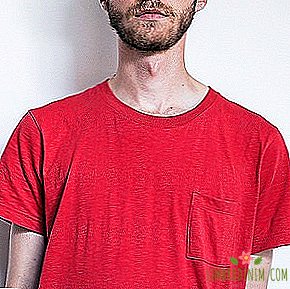Evaluator Lyubov Berlyanskaya on how to become a perfume expert
Under the heading "Business" we introduce readers to women of different professions and hobbies that we like or are simply interested in. This time we talked with Lyubov Berlyanskaya, a perfume expert and evaluator of the Russian brand Brocard. She told about the difference between the production of niche perfumes and bath cleaners, why perfumes need to be learned only in practice and how the Russians have specific preferences in smells.
Faberlic and zero
Since my school years, I liked chemistry and different smells, so I graduated from the Russian Chemical and Technical Institute, but this is unlikely to somehow affect my future career. As a student in the 90s, I started collecting perfumes, I had a great desire to work with perfumery professionally. Over time, I started my website, where I began to share my impressions of fragrances. At that time it was a rather rare thing, because it was almost impossible to find sane information in this area. It was difficult to learn something even about the main market, not to mention the “niche”, for which the courier was sent to Paris, and then everyone was going to “smell”.
This area was very closed, especially in Russia. But I was lucky, and a man from Faberlic stumbled across my site and worked on developing scents. By the way, at that moment the company officially worked with Pierre Bourdon. I was asked to come up with a textual concept for spirits - roughly speaking, to describe them in detail. The management arranged the result, and so I became the Faberlic perfumery brand manager. I must say that at that time I knew practically nothing about the industry.
In Faberlic, I was very fortunate to work with the director of the perfumery division, Irina Voshchina, who found the flourishing of the Soviet production of fragrances. She has tremendous knowledge about the production of perfumes, raw materials, and in general she is a great authority. Thanks to her, I had the opportunity to learn and understand how complex the process of creating an aroma is, how much needs to be done before launching a product on the market. At Faberlic, I worked for about two years, and then there was a crisis and cuts, and I, as a person who likes to argue, lost my job. But at the same time, I am very proud of what I did for this company, and the flavors I took part in creating.
Firmenich and air purifiers
At some point, as a result of a fortunate set of circumstances, I was invited to work at Firmenich, one of the world's largest manufacturers of fragrances and fragrances. There I began to work as an evaluator, one can say, as a translator between the customer of the fragrance and the perfumer. As a rule, clients do not understand anything about the specifics of perfumery and in the application, at best, prescribe a mudboard, and at worst, they ask you to do something “sweet” and “fresh”. My task is to understand what this person had in mind, and explain this to the perfumer already in the olfactory language (a special system of symbols adopted in perfumery. - Approx. Ed.). As an evaluator, I worked in all areas, from household chemicals to high perfumes. Engaged in fragrances for powders, shower gels, even cleaning products toilets.
It only seems that the smell for washing powder come up very simply - nothing like that! And one of the most difficult things in the perfume industry is air fresheners, because they are high-tech, that is, they must both smell nice and kill all odors. Often there are difficulties with the means for cleaning the bath and toilet. As a rule, they have a very aggressive chemical composition, and the perfume should cover this persistent odor, and most importantly - do not decompose under the influence of powerful components that make up the base of the cleaning agent. So the perfumers in this case are quite limited.
Brocard and alcohol spill
After several years of work in the Russian office of Firmenich, they called me to work for the Russian perfume brand Brocard. Now my tasks include analyzing the olfactory map, tracking trends in the market and developing new flavors.
My task is to create an aroma concept, and also to paint it in detail for manufacturers, including everything there: the intended packaging design, and the olfactory (smell) component. Then part of the application is sent to the perfume companies that will create the fragrance. As a rule, I do not describe the requirements for fragrances in great detail - just an approximate olfactory profile and mudboard, something in the spirit: "I would like a light fruity-floral scent with a hint of black currant." But if we are talking about a specific line, say, a flower one, then it is worth writing specifically, because the understanding of the smell of lilac in Russia and France is very different. The main giants of perfumery are in France and Switzerland, so most brands work with these countries.
It is important to take care of the packaging and the bottle. In accordance with the application, the production department selects components: a pump, an atomizer, a cover, and so on. The technical designer develops the case, while the graphic designer plans the packaging design. All this should fit into a strictly limited budget.
About a month later, perfume companies start sending options for the future fragrance - I get them, some leave, others immediately reject. Sometimes it happens that the desired flavor can be chosen from the first attempt, but, as a rule, successful variants have to be sent back for revision - sometimes two or three times. In general, this can be done endlessly, but, of course, time is tight, and you have to stop at one thing.
Then the lids and bottles are brought from abroad to the warehouse, and the composition is delivered to the plant - a perfume for the perfume, not yet diluted with alcohol. She needs to stand from 2 to 45 days in order to filter out poorly soluble substances - in the vial nothing outside should float. Brocard has its own Aroma-Promo plant in the Moscow region. It is impossible to pour alcohol under the table; all the production of alcohol-containing products is strictly regulated by the state. On average, the release of a new fragrance takes about nine months.
Fresh Russia and synthetics
I had to learn everything in practice, starting with my work at Faberlic. But otherwise it would not have happened, as far as I know, there are no specialized schools for future evaluators, and it is not very clear how this training would take place. In Firmenich, I had access to all databases, thanks to which it was possible to monitor trends and analyze the regional specifics of perfumery consumption. So I learned that the flavors that are loved in Brazil, China and South Africa are radically different from those that are usually preferred in Russia. For example, floral, spicy, very persistent and rich aromas, which are popular in the Middle East, sell poorly in Russia, partly due to climatic and environmental conditions. The main part of the territory of our country is the cold northern nature, and we also like fresh smells. Of course, we are not evaded by trends from Europe and the USA, but even in the mass market there is a place for regional specifics. For example, jasmine and tuberose, which are so loved in France and Italy, are not sold in the mass segment at all.
There is no fundamental difference between the production of mass, luxury and niche perfumes: the technological process is almost the same. However, a niche can afford not to focus on trends, while the luxury segment is actively using marketing research and wants to please everyone. Selective spirits have no such need, but, as a rule, fans are much less. The price of the fragrance depends on the volume of production and brand, that is, niche perfumes can be more expensive simply because of the limited release. But it is interesting that such brands as Tom Ford and Chanel are generally equivalent in terms of fame, and even more so in quality, but for some reason the exclusive line of Tom Ford is more expensive.
Any perfumery composition, starting with the mass market, ending with a niche, is a mixture of natural and synthetic substances. They complement each other, and the notion that a natural ingredient must necessarily be expensive is completely wrong. There are very expensive synthetics, exactly like very cheap natural ingredients. For example, citrus oil, which is obtained by direct extraction, is a cheap expendable material.
Children's sense of smell and perfume detox
To become a perfume critic, in my opinion, you just need to love smells and constantly train your olfactory memory. You can not start with the perfume, and your own kitchen, the next street - it is very important to notice the smells around. We perceive the world mainly through vision, and the sense of smell in this sense is pushed almost to the last place. I believe this can be fixed.
My five year old son has been in the world of smells since birth. I constantly give him something to smell and notice that his sense of smell is already developed quite strongly - he distinguishes smells well. And the stereotype that the smell is easy to spoil is not so true. By the way, most perfumers smoke relaxed from time to time.
I constantly try new flavors - this can be seen on instagram. Firstly, it is very important for me to train my nose every day so as not to lose the skill, and secondly, to be aware of all trends. Perfume detox suit myself only on vacation: I don’t take a single tube with me, but, of course, I continue to notice the smells that surround me.




